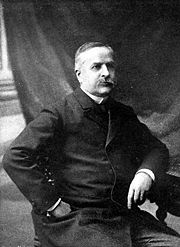
Albert Auguste Cochon de Lapparent
Encyclopedia

France
The French Republic , The French Republic , The French Republic , (commonly known as France , is a unitary semi-presidential republic in Western Europe with several overseas territories and islands located on other continents and in the Indian, Pacific, and Atlantic oceans. Metropolitan France...
geologist
Geologist
A geologist is a scientist who studies the solid and liquid matter that constitutes the Earth as well as the processes and history that has shaped it. Geologists usually engage in studying geology. Geologists, studying more of an applied science than a theoretical one, must approach Geology using...
.
He was born at Bourges
Bourges
Bourges is a city in central France on the Yèvre river. It is the capital of the department of Cher and also was the capital of the former province of Berry.-History:...
. After studying at the École polytechnique
École Polytechnique
The École Polytechnique is a state-run institution of higher education and research in Palaiseau, Essonne, France, near Paris. Polytechnique is renowned for its four year undergraduate/graduate Master's program...
from 1858 to 1860 he became ingénieur au corps des mines, and took part in drawing up the geological map of France; and in 1875 he was appointed professor of geology and mineralogy at the Catholic Institute
Institut Catholique de Paris
The Institut Catholique de Paris, or the Catholic University of Paris, is a private university located in Paris, France. The institute was founded in 1875, under the name Université Catholique de Paris, by Maurice Le Sage d'Hauteroche d'Hulst....
in Paris
Paris
Paris is the capital and largest city in France, situated on the river Seine, in northern France, at the heart of the Île-de-France region...
. In 1879 he prepared an important memoir for the geological survey of France on the Pays de Bray
Pays de Bray
The Pays de Bray is a small natural region of France situated to the north-east of Rouen, straddling the French départements of the Seine-Maritime and Oise...
, a subject on which he had already published several memoirs, and in 1880 he served as president of the Société Géologique de France
Société géologique de France
The Société géologique de France is a French learned society founded on 17 March 1830. As of 2006, it counts 1,200 members....
. In 1881-1883 he published his Traité de géologie, a well-regarded textbook of stratigraphy
Stratigraphy
Stratigraphy, a branch of geology, studies rock layers and layering . It is primarily used in the study of sedimentary and layered volcanic rocks....
.
His other works include Cours de minéralogie (1884), La formation des combustibles minéraux (1886), Le niveau de la mer et ses variations (1886), Les tremblements de terre (1887), La géologie en chemin de fer (1888), Précis de minéralogie (1888), Le siècle du fer (1890), Les anciens glaciers (1893), Leçons de géographie physique (1896), Notions générales sur l'écorce terrestre (1897), Le globe terrestre (1899), and Science et apologétique (1905).
With Achille Delesse
Achille Ernest Oscar Joseph Delesse
Achille Ernest Oscar Joseph Delesse was a French geologist and mineralogist.He was born at Metz. At the age of twenty he entered the Ecole Polytechnique, and subsequently passed through the Ecole des Mines...
he was for many years editor of the Revue de géologie and contributed to the Extraits de géologie, and he joined with Alfred Potier
Alfred Potier
Alfred Potier was a French polymath who contributed to many theoretical and practical fields of science when this was rapidly expanding...
in the geological surveys undertaken in connection with the Channel Tunnel
Channel Tunnel
The Channel Tunnel is a undersea rail tunnel linking Folkestone, Kent in the United Kingdom with Coquelles, Pas-de-Calais near Calais in northern France beneath the English Channel at the Strait of Dover. At its lowest point, it is deep...
proposals.
He died in Paris
Paris
Paris is the capital and largest city in France, situated on the river Seine, in northern France, at the heart of the Île-de-France region...
in 1908.

